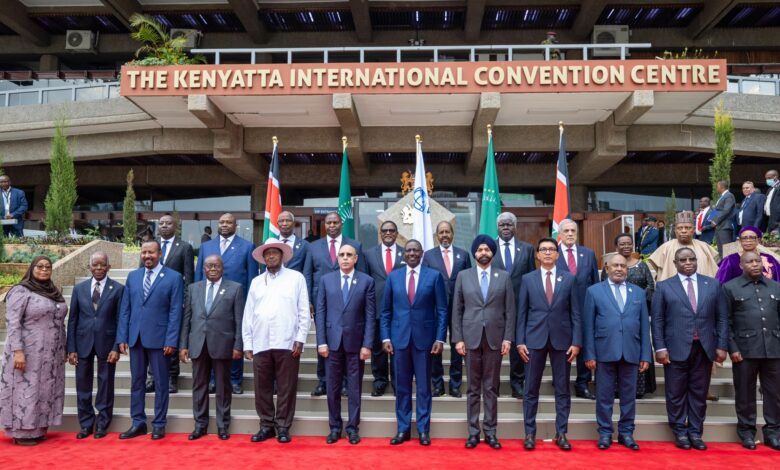African Leaders Call For Ambitious $120 Billion IDA Replenishment At Nairobi Summit
The call comes amid multiple challenges facing the continent, including the debt crisis, climate change impacts, and ongoing geopolitical tensions.

Nineteen African heads of state have rallied for a robust replenishment of $120 billion for the International Development Association (IDA) at the IDA 21 summit held in Nairobi, Kenya, on April 29.
The summit witnessed a unified voice from African leaders urging for a substantial increase in funding to support the continent’s development efforts.
The call comes as Africa grapples with multiple challenges, including the debt crisis, climate change impacts, effects of the COVID-19 pandemic, and geopolitical tensions. The current IDA replenishment cycle coincides with a period of unprecedented challenges for African countries, necessitating significant financial support.
Kenyan President William Ruto stated, “Our proposal and request entail a vision for Africa-driven socio-economic development, executed with transparency and inclusiveness, and our case is straightforward. Significant capital injection into IDA is crucial. The G20 Independent Expert Group recommends tripling IDA’s financing capacity to US$279 billion by 2030 while maintaining the essential concessional nature of its financing. At the very least, let us not ignore or wish away this expert advice.”
During the summit, chaired by Mohamed Ould Ghazouani, the Chair of the African Union, African leaders emphasised the urgent need for stable and predictable increases in concessional financing flows to the continent. They called upon donor countries to step up their contributions to the IDA later this year, highlighting the importance of investments in human capital, energy access, digital infrastructure, climate resilience, health, and education.
In a communique, heads of state stressed the importance of an ambitious IDA 21 replenishment that aligns with Africa’s developmental aspirations. They pointed out the need for increased access to long-term concessional financing. They also emphasised the importance of stronger partnerships and effective coordination to achieve the continent’s economic and development agenda.
As discussions continue, the focus remains on ensuring that IDA21 delivers a meaningful impact and contributes to Africa’s sustainable and inclusive development agenda.
Fatten Agad, Executive Director of African Future Policies Hub, said, “The level of ambition of IDA21 will be a very important signal on how serious is the international community about empowering the Bank to respond to pressing needs of IDA beneficiaries notably in light of the World Bank evolution roadmap to allow the Bank, for example, to finance climate action and other emerging development issues such as pandemics and the digital transition.”
Joab Okanda, Senior Advocacy Advisor at Christian Aid, said there is a need to assess the programme’s effectiveness.
“For IDA21 to be truly a lifesaver jacket for African countries that are currently sinking deeper into a cocktail of climate and economic shocks, the policy and financial package that comes out of the IDA21 replenishment must address the fundamental question of why only a very tiny fraction of countries have been able to graduate out of IDA in the past 60 years,” Joab said.
“It’s high time we stitched the wound rather than add bigger gauze bandage onto a deep bleeding wound. Discussions must centre around building a just and equitable world where IDA is no longer needed. This world is possible if the World Bank and IDA donor countries make the political choice to genuinely reform the global financial architecture and allow developing countries to equally participate in global economic decision making.”
Africa is one of the most vulnerable continents to the impacts of climate change despite contributing the least to global greenhouse gas emissions. The region faces challenges exacerbated by climate change, including extreme weather events, loss of biodiversity, desertification, sea-level rise, and food insecurity.
International Development Association (IDA) is the arm of the World Bank that provides grants and highly concessional financing to the poorest countries.
IDA financing is provided through grants and zero- or extremely low-interest credits that can be repaid over long periods. This makes it an affordable source of financing that does not saddle countries with debt.
Ajay Banga, President of the World Bank Group, stated, “IDA remains dedicated to supporting your efforts and investing in the people of Africa. We are working to make IDA more efficient and able to deliver faster by cutting burdensome rules, requirements, and redundancies.”
“We believe a simpler and reimagined IDA can be deployed with more focus to make meaningful impact to advance fundamental needs like energy access and health care availability, realise agricultural potential, and build out critical infrastructure and skills,” he added.
Support Our Journalism
There are millions of ordinary people affected by conflict in Africa whose stories are missing in the mainstream media. HumAngle is determined to tell those challenging and under-reported stories, hoping that the people impacted by these conflicts will find the safety and security they deserve.
To ensure that we continue to provide public service coverage, we have a small favour to ask you. We want you to be part of our journalistic endeavour by contributing a token to us.
Your donation will further promote a robust, free, and independent media.
Donate HereStay Closer To The Stories That Matter




